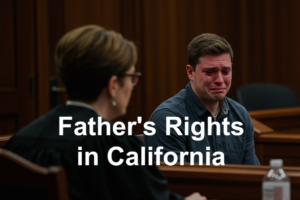Father’s Rights in the State of California and Common Mistakes to Avoid

When it comes to child custody cases and divorce, father’s rights in California are often misunderstood or overlooked. Many fathers mistakenly believe they have fewer rights than mothers, but California law is clear: both parents have equal rights under the law.
In a majority of cases, fathers will mistakenly relinquish their rights early on during child support, visitation or custody hearings, often resulting in an unjust separation agreement.
The following article will highlight frequent mistakes made by fathers during custody disputes as well as underline what the State of California has to say regarding father’s rights.
Common Mistakes Fathers Make in California Custody & Visitation Cases
In the progression of a separation, divorce or child custody dispute, mistakes can be unavoidable. However, when it pertains to child custody, mistakes can often be very costly. Every family court in the State of California will examine each individual family dynamic and seek to place a child in an environment that is in the best interest of the child.
The following are key mistakes that should be avoided:
- Violating Custody or Visitation Orders – Child custody tends to be a lengthy process. As a result, many family courts will usually mandate temporary custody orders to be in place while a final ruling is made. Here, it is in the best interest of the father to follow the court’s orders and work to get unfair rulings reevaluated and/or modified. The most opportune time to modify a custody order is when the current orders are only temporary, because to do so considers the best interest of the child. However, once a custody order becomes final, a father must show a significant change of circumstances to justify modification. This can be problematic for fathers and often lead to a violation of orders when parents make unilateral decisions and actions in violation of the custody order.
- Failing to Respond – Whether this is an oversight or caused as a result of work-related responsibilities, fathers will often fail to respond to legal actions concerning child custody. What many parents fail to consider is that the failure to respond will result in what is known as a “default judgment”. This will usually mean that what the other party has requested will be granted. Under certain situations, a court can also make additional judgments that it has deemed necessary and appropriate.
- Signing an Unfavorable Settlement Agreement – When given incorrect information, fathers can often sign unfavorable settlement agreements. It is important to review documents and agreements carefully before signing them, as reversing settlements can often be impossible to make.
Understanding Father’s Rights in California Family Law
Under Family Code Section 3020(b), children are to have regular interaction with both parents when the parents have dissolved the marriage. The policy of the State of California is to provide frequent and continuing contact with both parents of the child so long as it is in the best interest of the child. California law encourages parents to mutually share the obligations of child rearing.
Fathers should not assume that mothers would have primary custody of a child. Under current California law, fathers have equal rights to not only have primary custody of a child, but to also petition for child support from the mother.
Hire an Experienced Father’s Rights Attorney
Family law in the State of California is a delicate matter that demands careful review. If you are a father seeking to obtain primary custody of a child or other custody arrangement, seek the legal support of an experienced family law attorney.
The Riverside father’s rights attorneys at the Knez Law Group are skilled in the field of child custody, child support and visitation cases in the State of California. The firm is dedicated to ensuring that the parent’s rights are upheld in a court of law. Child custody is a sensitive matter; standing up for the rights of a parent is imperative in every single case.
Call Knez Law Group now at (951) 742-7681 or fill out a contact form and we will contact you ASAP. YOU DON’T HAVE TO GO THROUGH THIS ALONE.

Andrew J. Knez earned his Bachelor of Arts degrees in Political Science and Criminal Justice from California State University, Fullerton. During his college years, he was a member of the Pi Kappa Phi Fraternity and interned at the College Legal Clinic, where he assisted underprivileged communities in obtaining affordable legal services. Mr. Knez credits this experience with fostering his appreciation for the law and its positive impact on society. Additionally, during college, Mr. Knez worked as a paralegal, gaining hands-on experience in civil litigation. Learn more here.
